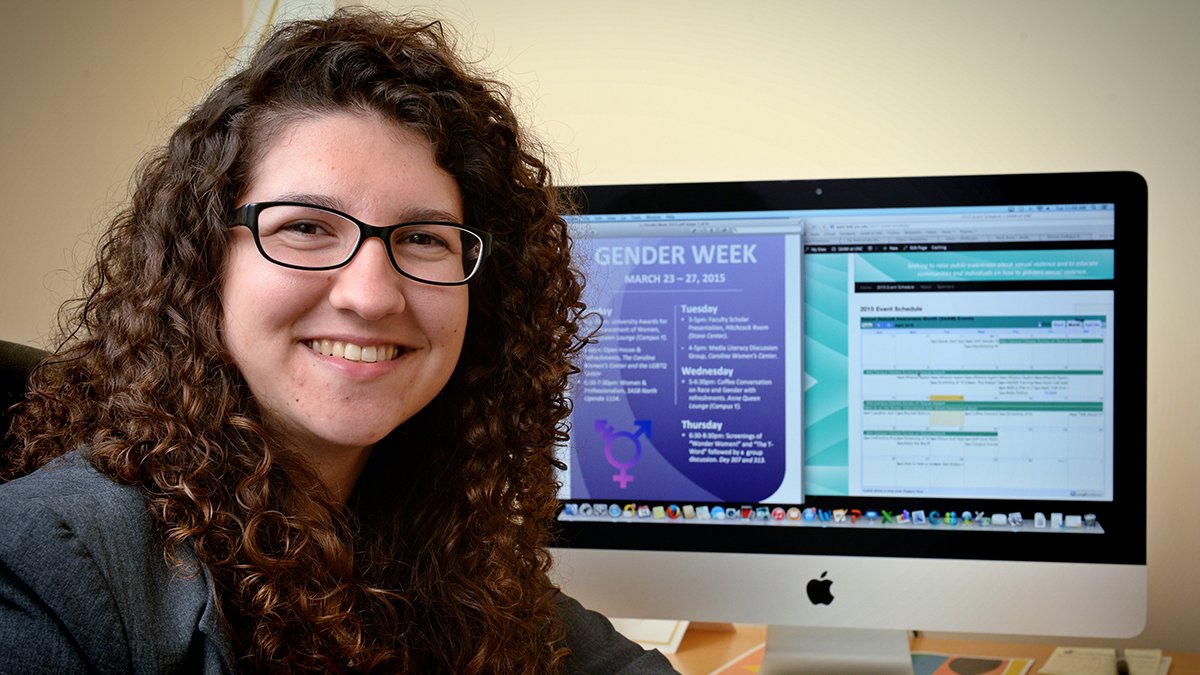Program inspiration
The Women’s Center focuses on violence prevention, family advocacy, closing gender gaps and gender, difference and diversity.

When Shelley Gist was assigned as a sophomore to intern at the Carolina Women’s Center, she never knew how much the center and its mission to build gender equity would inspire her career.
What began as a college internship of creating innovative programs to educate the community has turned into a career for Gist as she took over as the center’s program coordinator.
“I fell in love with the center, the people here and the work they were doing on campus,” said Gist, who graduated in 2014. “It’s just been a great place to be. I spent that [first] semester planning programming and ended up never leaving. I loved it so much I just couldn’t leave.”
A Raleigh native, Gist attended the University of North Carolina at Chapel Hill to earn a psychology degree with a minor in creative writing. But through an APPLES Service-Learning course with the Carolina Center for Public Service and as a resident assistant, Gist fostered a passion to help others.
The Women’s Center, which focuses on violence prevention, family advocacy, closing gender gaps and gender, difference and diversity, became Gist’s platform to provide a service for the community. She now helps students build their own programs and platforms — like she did as an undergraduate.
“There was no job that was too big or too small for Shelley. She’s got a lot of initiative, but comes at it through the spirit of service,” said Christi Hurt, director of the Women’s Center. “She wants to figure out how to be helpful. She’s not looking for a notch in her belt or something to put on her resume. She’s doing it as a way to benefit the whole Carolina community.”
During the APPLES course, Gist was assigned to the Women’s Center where she helped organize the University’s Sexual Assault Awareness Month. From there, she was given the freedom to build her own programs, including the now-popular Alternative Break Experience.
“It wasn’t just that I showed up and they told me what to do,” Gist said. “The staff here was good about letting the students develop their own ideas and then helping give us the resources to implement those.”
Her Alternative Break program “combines what students may be learning in the classroom and having discussions about, and seeing what it looks like in the real world,” Gist said.
In October, a group of eight to 10 students spend fall break in Asheville working with a rape crisis center conducting outreach that helps to train bar staff to recognize drug and alcohol facilitated sexual assault. During spring break, a group travels to New Bern and Wilmington, to learn from rape crisis centers and child-serving organizations.
Gist’s creativity and ability to launch new programs earned her respect within the organization, which only had two full-time employees at the time.
“It’s really important to have a person who can think outside the box,” Hurt said. “What the Women’s Center is really trying to do is be an incubator for people who come and identify issues that they want to address and figure out solutions.”
“As a student coming in with ideas and with the creativity to help identify community need and address it – that’s exactly the kind of initiative the Women’s Center really focuses on and supports.”
As a senior — not thinking joining the Women Center’s staff was a possibility — Gist applied for jobs outside the University, but when a position was created during her final semester she jumped at it.
“This was an opportunity to combine my work as an RA and my work that I had done at the Women’s Center and focus that programming through a gender equity lens,” Gist said. “It felt like the perfect combination of those two things that I was passionate about.”
Gist is now tasked with giving Carolina students the tools they need to develop new programs of their own. As program coordinator, Gist is trying to help ensure that the Center isn’t an unknown for Carolina students like it once was for her.
By partnering with other campus organizations to building connections, the Center aims to grow its programing and continue to educate the community.
“What we’re trying to do is make sure that gender is not a barrier to anybody’s success at UNC,” she said.
For more information on UNC-Chapel Hill’s Sexual Assault Awareness Month programs, click here.




